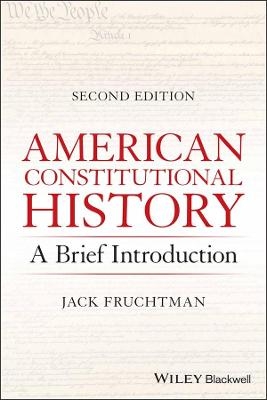
American Constitutional History
Wiley-Blackwell (Verlag)
978-1-119-73427-7 (ISBN)
Updated to cover the period from 2015 to 2021, the second edition examines the controversial presidential election of 2020 in which Donald Trump, despite losing the electoral and popular vote, claimed victory and espoused charges of widespread election fraud. New coverage of the addition of Neil Gorsuch, Brett Kavanaugh, and Amy Coney Barrett to the Supreme Court is complemented by discussion of important decisions made after 2015, including affirming same-sex marriage, a woman's right to abortion under certain circumstances, the right to own and carry a firearm, and the central place of religious liberty in American society. This book also:
Highlights the Constitution's evolution through government regulation of the economy, individual and civil rights, and executive power
Reflects the evolution of constitutional changes made by the Supreme Court up to June 2021
Discusses topics such as the ideological origins of the U.S Constitution, the Civil War and Reconstruction, the civil rights movement, and growth of executive power
Includes chapter overviews, summaries, and descriptions of formal constitutional amendments ratified by the states
American Constitutional History: A Brief Introduction, Second Edition is an excellent introductory textbook for upper-level undergraduate and graduate courses in American history and political science and a must-read for general readers seeking insights into the origins and evolution of the U.S. Constitution.
JACK FRUCHTMAN is Professor Emeritus of Political Science and former Director of the Program in Law and American Civilization at Towson University, Maryland, USA. He has authored seven books, including studies of the political thought of Richard Price, Joseph Priestley, and Thomas Paine, and has edited, co-edited, or annotated another five. Professor Fruchtman taught American constitutional law and politics at Towson from 1978 until his retirement in 2019.
Acknowledgments xi
Prologue xiv
The Structure of the Book xviii
Part 1 The New Republic, 1781–1828 1
The Classical Republican Tradition 1
John Locke, Deism, and Religious Liberty 5
1 Ideological Origins of the New Republic 9
The Articles of Confederation and the Constitutional Convention 10
Ratification and the Bill of Rights 20
2 Representative and Constitutional Democracy 28
Judicial Review, Judicial Duty 31
Economic Policy in the New Republic 35
3 Nationalization of the Constitution and Executive Power 45
Part 2 The Slave Republic, 1789–1877 53
Constitutional Amendments 56
4 Commerce, Nullification, and Slavery 59
Other Economic Rulings 60
The Nullification Controversy 62
Dred Scott 65
5 Civil War and Reconstruction 69
Lincoln and War 70
Reconstruction 77
6 Rights and Privileges 82
Privileges and Immunities 84
Women’s Rights 87
Persecution of Newly Freed Slaves 89
Part 3 The Free Market Republic, 1877–1937 93
Constitutional Amendments 94
7 The Development of Substantive Due Process 97
Procedural Due Process 98
Substantive Due Process 99
Restraint of Trade in the Free Market Era 102
Liberty of Contract 104
Regulating Industry 108
The Great Depression 110
8 Civil Rights After Reconstruction 112
Equality and African Americans 112
Parents and Educational Rights 120
The Right to Be Let Alone 121
9 The Re-emergence of Executive Power 123
Leadership and the Presidency 123
America and World War I 125
Criminal Anarchy and Criminal Syndicalism in the 1920s 134
Part 4 The Welfare State Republic, 1937–1995 139
Constitutional Amendments 140
10 Advocates and Enemies of Social Welfare 143
The Court Changes 145
New Social Welfare Programs 148
11 The Growth of Civil Liberties 150
Free Expression 150
Free Press 154
Religious Establishments 156
Criminal Suspects and Capital Punishment 159
Privacy 163
12 The Civil Rights Movement 167
School Desegregation 167
Civil and Voting Rights 170
Strict Scrutiny and Affirmative Action in Higher Education 172
Affirmative Action in Government Contracts 176
Women’s Rights and Affirmative Action 177
13 Expanding Presidential Power 180
Presidential Power and Japanese Internments 181
Military Tribunals 185
Vietnam and Its Aftermath 186
Re-emergence of a Powerful Executive 188
Part 5 The Executive Republic, 1995–2021 193
14 Federal Commerce Power and Economic Regulation 199
Narrowing Federal Commerce Power 200
Healthcare Reform 203
15 Civil Liberties and Judicial Doctrines 208
Religious Establishments 209
Religious Liberty 212
Campaign Finance and Speech Rights 216
The Right to Bear Arms 218
The Right to Privacy 221
16 The Struggle for Equal Rights and Criminal Justice 224
Affirmative Action and Education 225
Same-Sex and Transgender Rights 227
Voting Rights 231
Capital Punishment and Criminal Justice 234
17 The Continued Growth of Executive Power 238
Foreign Terrorist Attacks and the Bush Administration 239
Wars in Afghanistan and Iraq 242
Obama and Unilateral Executive Action 245
Executive Authority under Trump 250
The Mueller Investigation and the First Impeachment 253
Epilogue
The 2020 Presidential Campaign and Its Aftermath 258
The Campaign and the Second Trump Impeachment 258
The Biden Presidency, 2021 261
A Republic If You Can Keep It 263
Bibliography 268
Prologue 267
Part 1: The New Republic, 1781–1828 268
Part 2: The Slave Republic, 1789–1877 269
Part 3: The Free Market Republic, 1877–1937 270
Part 4: The Welfare State Republic, 1937–1995 271
Part 5: The Executive Republic, 1995–2021 272
Epilogue 274
Index 276
| Erscheinungsdatum | 18.02.2022 |
|---|---|
| Verlagsort | Hoboken |
| Sprache | englisch |
| Maße | 152 x 226 mm |
| Gewicht | 476 g |
| Themenwelt | Geisteswissenschaften ► Geschichte |
| Recht / Steuern ► Allgemeines / Lexika | |
| Recht / Steuern ► EU / Internationales Recht | |
| Sozialwissenschaften ► Politik / Verwaltung | |
| ISBN-10 | 1-119-73427-4 / 1119734274 |
| ISBN-13 | 978-1-119-73427-7 / 9781119734277 |
| Zustand | Neuware |
| Informationen gemäß Produktsicherheitsverordnung (GPSR) | |
| Haben Sie eine Frage zum Produkt? |
aus dem Bereich


